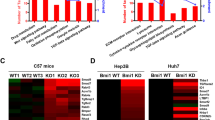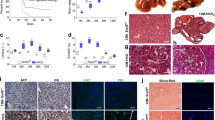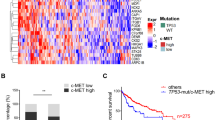Abstract
Hepatocarcinogenesis results from the accumulation of genetic and epigenetic changes in liver cells. A common mechanism through which these alterations induce liver cancer is by deregulating signaling pathways. A number of signaling pathways, including the PI3K/PTEN/AKT and transforming growth factor β (TGF-β) pathways have been implicated in normal liver development as well as in cancer formation. In this study, we assessed the effect of the TGF-β signaling pathway on liver tumors induced by phosphatase and tensin homolog (Pten) loss. Inactivation of only the TGF-β receptor type II, Tgfbr2, in the mouse liver (Tgfbr2LKO) had no overt phenotype, while inactivation of Pten alone (PtenLKO), resulted in the formation of both hepatocellular carcinomas and cholangiocarcinomas (CC). Interestingly, deletion of both Pten and Tgfbr2 (PtenLKO;Tgfbr2LKO) in the mouse liver resulted in a dramatic shift in tumor type to predominantly CC. Assessment of the PI3K/PTEN/AKT pathway revealed increased phosphorylation of AKT and glycogen synthase kinase 3 beta (GSK-3β) in both the PtenLKO and PtenLKO;Tgfbr2LKO mice, suggesting that this pathway is constitutively active regardless of the status of the TGF-β signaling pathway. However, phosphorylation of p70 S6 kinase was observed in the liver of all three phenotypes (Tgfbr2LKO, PtenLKO, PtenLKO;Tgfbr2LKO) indicating that the loss of Tgfbr2 and/or Pten leads to an increase in this signaling pathway. Analysis of markers of liver progenitor/stem cells revealed that the loss of TGF-β signaling resulted in increased expression of c-Kit and CD133. Furthermore, in addition to increased c-Kit and CD133, Scf and EpCam expression were also increased in the double knock-out mice. These results suggest that the alteration in tumor types between the PtenLKO mice and PtenLKO;Tgfbr2LKO mice is secondary to the altered regulation of stem-cell features induced by the loss of TGF-β signaling.
This is a preview of subscription content, access via your institution
Access options
Subscribe to this journal
Receive 50 print issues and online access
$259.00 per year
only $5.18 per issue
Buy this article
- Purchase on Springer Link
- Instant access to full article PDF
Prices may be subject to local taxes which are calculated during checkout






Similar content being viewed by others
References
Jemal A, Bray F, Center MM, Ferlay J, Ward E, Forman D . Global cancer statistics. CA Cancer J Clin 2011; 61: 69–90.
Singal AK, Vauthey JN, Grady JJ, Stroehlein JR . Intra-hepatic cholangiocarcinoma—frequency and demographic patterns: thirty-year data from the M.D. Anderson Cancer Center. J Cancer Res Clin Oncol 2011; 137: 1071–1078.
Yeh MM . Pathology of combined hepatocellular-cholangiocarcinoma. J Gastroenterol Hepatol 2010; 25: 1485–1492.
Wu X Li Y . Signaling pathways in liver cancer. Julianov, A (ed). Liver Tumors, 2012, pp 37–58. http://www.intechopen.com/books/liver-tumors/signaling-pathways-in-liver-cancer.
Majumdar A, Curley SA, Wu X, Brown P, Hwang JP, Shetty K et al. Hepatic stem cells and transforming growth factor beta in hepatocellular carcinoma. Nat Rev Gastroenterol Hepatol 2012; 9: 530–538.
Fabregat I . Dysregulation of apoptosis in hepatocellular carcinoma cells. World J Gastroenterol 2009; 15: 513–520.
Breuhahn K, Longerich T, Schirmacher P . Dysregulation of growth factor signaling in human hepatocellular carcinoma. Oncogene 2006; 25: 3787–3800.
Whittaker S, Marais R, Zhu AX . The role of signaling pathways in the development and treatment of hepatocellular carcinoma. Oncogene 2010; 29: 4989–5005.
Chalhoub N, Baker SJ . PTEN and the PI3-kinase pathway in cancer. Annu Rev Pathol 2009; 4: 127–150.
Carracedo A, Pandolfi PP . The PTEN-PI3K pathway: of feedbacks and cross-talks. Oncogene 2008; 27: 5527–5541.
Shi Y, Paluch BE, Wang X, Jiang X . PTEN at a glance. J Cell Sci 2012; 125: 4687–4692.
Yao YJ, Ping XL, Zhang H, Chen FF, Lee PK, Ahsan H et al. PTEN/MMAC1 mutations in hepatocellular carcinomas. Oncogene 1999; 18: 3181–3185.
Hu TH, Huang CC, Lin PR, Chang HW, Ger LP, Lin YW et al. Expression and prognostic role of tumor suppressor gene PTEN/MMAC1/TEP1 in hepatocellular carcinoma. Cancer 2003; 97: 1929–1940.
Forbes SA, Bhamra G, Bamford S, Dawson E, Kok C, Clements J et al. The catalogue of somatic mutations in cancer (COSMIC). Curr Protoc Hum Genet 2008; 57: 10.11.1–10.11.26.
Knobbe CB, Lapin V, Suzuki A, Mak TW . The roles of PTEN in development, physiology and tumorigenesis in mouse models: a tissue-by-tissue survey. Oncogene 2008; 27: 5398–5415.
Rountree CB, Ding W, He L, Stiles B . Expansion of CD133-expressing liver cancer stem cells in liver-specific phosphatase and tensin homolog deleted on chromosome 10-deleted mice. Stem Cells 2009; 27: 290–299.
Stiles B, Wang Y, Stahl A, Bassilian S, Lee WP, Kim YJ et al. Liver-specific deletion of negative regulator Pten results in fatty liver and insulin hypersensitivity [corrected]. Proc Natl Acad Sci USA 2004; 101: 2082–2087.
Horie Y, Suzuki A, Kataoka E, Sasaki T, Hamada K, Sasaki J et al. Hepatocyte-specific Pten deficiency results in steatohepatitis and hepatocellular carcinomas. J Clin Invest 2004; 113: 1774–1783.
Galicia VA, He L, Dang H, Kanel G, Vendryes C, French BA et al. Expansion of hepatic tumor progenitor cells in Pten-null mice requires liver injury and is reversed by loss of AKT2. Gastroenterology 2010; 139: 2170–2182.
Amin R, Mishra L . Liver stem cells and tgf-Beta in hepatic carcinogenesis. Gastrointest Cancer Res 2008; 2: S27–S30.
Herrera B, Sanchez A, Fabregat I . BMPS and liver: more questions than answers. Curr Pharm Des 2012; 18: 4114–4125.
Zaret KS . Hepatocyte differentiation: from the endoderm and beyond. Curr Opin Genet Dev 2001; 11: 568–574.
Clotman F, Jacquemin P, Plumb-Rudewiez N, Pierreux CE, Van der Smissen P, Dietz HC et al. Control of liver cell fate decision by a gradient of TGF beta signaling modulated by onecut transcription factors. Genes Dev 2005; 19: 1849–1854.
Wu K, Ding J, Chen C, Sun W, Ning BF, Wen W et al. Hepatic transforming growth factor beta gives rise to tumor-initiating cells and promotes liver cancer development. Hepatology 2012; 56: 2255–2267.
Shiraki N, Umeda K, Sakashita N, Takeya M, Kume K, Kume S . Differentiation of mouse and human embryonic stem cells into hepatic lineages. Genes Cells 2008; 13: 731–746.
Cai J, Zhao Y, Liu Y, Ye F, Song Z, Qin H et al. Directed differentiation of human embryonic stem cells into functional hepatic cells. Hepatology 2007; 45: 1229–1239.
Kitisin K, Ganesan N, Tang Y, Jogunoori W, Volpe EA, Kim SS et al. Disruption of transforming growth factor-beta signaling through beta-spectrin ELF leads to hepatocellular cancer through cyclin D1 activation. Oncogene 2007; 26: 7103–7110.
Bierie B, Moses HL . TGF-beta and cancer. Cytokine Growth Factor Rev 2006; 17: 29–40.
Attisano L, Wrana JL . Signal integration in TGF-beta, WNT, and Hippo pathways. F1000Prime Rep 2013; 5: 17.
Peyrou M, Bourgoin L, Foti M . PTEN in liver diseases and cancer. World J Gastroenterol 2010; 16: 4627–4633.
Hollander MC, Blumenthal GM, Dennis PA . PTEN loss in the continuum of common cancers, rare syndromes and mouse models. Nat Rev Cancer 2011; 11: 289–301.
Postic C, Magnuson MA . DNA excision in liver by an albumin-Cre transgene occurs progressively with age. Genesis 2000; 26: 149–150.
Lesche R, Groszer M, Gao J, Wang Y, Messing A, Sun H et al. Cre/loxP-mediated inactivation of the murine Pten tumor suppressor gene. Genesis 2002; 32: 148–149.
Xu X, Kobayashi S, Qiao W, Li C, Xiao C, Radaeva S et al. Induction of intrahepatic cholangiocellular carcinoma by liver-specific disruption of Smad4 and Pten in mice. J Clin Invest 2006; 116: 1843–1852.
Wakefield LM, Hill CS . Beyond TGFbeta: roles of other TGFbeta superfamily members in cancer. Nat Rev Cancer 2013; 13: 328–341.
Wennerberg AE, Nalesnik MA, Coleman WB . Hepatocyte paraffin 1: a monoclonal antibody that reacts with hepatocytes and can be used for differential diagnosis of hepatic tumors. Am J Pathol 1993; 143: 1050–1054.
Kim H, Park C, Han KH, Choi J, Kim YB, Kim JK et al. Primary liver carcinoma of intermediate (hepatocyte-cholangiocyte) phenotype. J Hepatol 2004; 40: 298–304.
Sugimachi K, Aishima S, Taguchi K, Tanaka S, Shimada M, Kajiyama K et al. The role of overexpression and gene amplification of cyclin D1 in intrahepatic cholangiocarcinoma. J Hepatol 2001; 35: 74–79.
Zhou L, Liu J, Luo F . Serum tumor markers for detection of hepatocellular carcinoma. World J Gastroenterol 2006; 12: 1175–1181.
Luo SM, Tan WM, Deng WX, Zhuang SM, Luo JW . Expression of albumin, IGF-1, IGFBP-3 in tumor tissues and adjacent non-tumor tissues of hepatocellular carcinoma patients with cirrhosis. World J Gastroenterol 2005; 11: 4272–4276.
Yamashita T, Wang XW . Cancer stem cells in the development of liver cancer. J Clin Invest 2013; 123: 1911–1918.
Mansuroglu T, Baumhoer D, Dudas J, Haller F, Cameron S, Lorf T et al. Expression of stem cell factor receptor c-kit in human nontumoral and tumoral hepatic cells. Eur J Gastroenterol Hepatol 2009; 21: 1206–1211.
Mansuroglu T, Ramadori P, Dudas J, Malik I, Hammerich K, Fuzesi L et al. Expression of stem cell factor and its receptor c-Kit during the development of intrahepatic cholangiocarcinoma. Lab Invest 2009; 89: 562–574.
Petritsch C, Beug H, Balmain A, Oft M . TGF-beta inhibits p70 S6 kinase via protein phosphatase 2A to induce G(1) arrest. Genes Dev 2000; 14: 3093–3101.
Chen CL, Tsukamoto H, Liu JC, Kashiwabara C, Feldman D, Sher L et al. Reciprocal regulation by TLR4 and TGF-beta in tumor-initiating stem-like cells. J Clin Invest 2013; 123: 2832–2849.
Mittal S, El-Serag HB . Epidemiology of hepatocellular carcinoma: consider the population. J Clin Gastroenterol 2013; 47: S2–S6.
Postic C, Shiota M, Niswender KD, Jetton TL, Chen Y, Moates JM et al. Dual roles for glucokinase in glucose homeostasis as determined by liver and pancreatic beta cell-specific gene knock-outs using Cre recombinase. J Biol Chem 1999; 274: 305–315.
Chytil A, Magnuson MA, Wright CV, Moses HL . Conditional inactivation of the TGF-beta type II receptor using Cre:Lox. Genesis 2002; 32: 73–75.
Romero-Gallo J, Sozmen EG, Chytil A, Russell WE, Whitehead R, Parks WT et al. Inactivation of TGF-beta signaling in hepatocytes results in an increased proliferative response after partial hepatectomy. Oncogene 2005; 24: 3028–3041.
Thoolen B, Maronpot RR, Harada T, Nyska A, Rousseaux C, Nolte T et al. Proliferative and nonproliferative lesions of the rat and mouse hepatobiliary system. Toxicol Pathol 2010; 38: 5S–81S.
Deschl U, Cattley R, Harada T, Kuttler K, Hailey J, Hartig F et al. Liver, gallbladder and exocrine pancreas. In: Mohr U (ed). International Classification of Rodent Tumors: the mouse. Springer Verlag: Heidelberg, Germany, 2001, pp 59–86.
Morris SM, Baek JY, Koszarek A, Kanngurn S, Knoblaugh SE, Grady WM . Transforming growth factor-beta signaling promotes hepatocarcinogenesis induced by p53 loss. Hepatology 2012; 55: 121–131.
Acknowledgements
This work is supported in part by funding from Burroughs Wellcome Fund, the National Institutes of Health (RO1 DK60669-01 and P30 CA015704, WMG) and by the National Institutes of Health Interdisciplinary Training Grant (T32 CA080416, SMM). The authors thank Jean Campbell and members of the Grady laboratory for helpful suggestions. We also wish to acknowledge support from the Experimental Histopathology, Scientific Imaging and Comparative Medicine Cores at the Fred Hutchinson Cancer Research Center.
Author information
Authors and Affiliations
Corresponding author
Ethics declarations
Competing interests
The authors declare no conflict of interest.
Additional information
Supplementary Information accompanies this paper on the Oncogene website
Supplementary information
Rights and permissions
About this article
Cite this article
Morris, S., Carter, K., Baek, J. et al. TGF-β signaling alters the pattern of liver tumorigenesis induced by Pten inactivation. Oncogene 34, 3273–3282 (2015). https://doi.org/10.1038/onc.2014.258
Received:
Revised:
Accepted:
Published:
Issue Date:
DOI: https://doi.org/10.1038/onc.2014.258
This article is cited by
-
Interaction of peripheral CD4+CD25+CD127− Tregs with prolactin in HCV hepatocellular carcinoma: oncogenic or immunogenic mechanisms
Egyptian Liver Journal (2023)
-
Withaferin A inhibits proliferation of human endometrial cancer cells via transforming growth factor-β (TGF-β) signalling
3 Biotech (2021)
-
Identification of miR-135b as a novel regulator of TGFβ pathway in gastric cancer
Journal of Physiology and Biochemistry (2020)
-
Hepatic stellate cells: central modulators of hepatic carcinogenesis
BMC Gastroenterology (2015)



